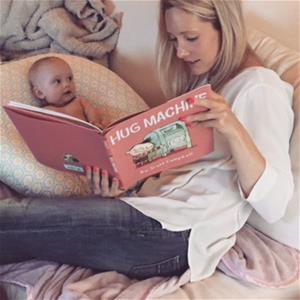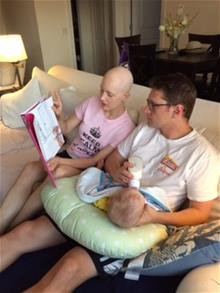 "The most important thing you will do this year is read," I told my students on the first day of school. I looked at their dubious faces and promised, "You will love it."
"The most important thing you will do this year is read," I told my students on the first day of school. I looked at their dubious faces and promised, "You will love it."
True to my word, we spent an inordinate amount of the school day immersed in texts. We read newspapers, novels, poems, songs, math problems, comic strips, and recipes. We read aloud and silently, we read in groups and individually, we read with partners in our class and we ventured to lower grades to read with buddies. Before long, of their own volition, students were reading at lunch, at recess, on the subway platform while waiting for the train and on the subway itself while en route to field trips.
A fellow straphanger, upon noticing half the train filled with kids absorbed in books, once observed, "Your students love to read!"
"Damn straight," I said proudly. "Eat, sleep, read, baby."
My first year of teaching, I decided nothing I did with my students was more important than reading. Students who read better wrote better, had stronger vocabularies, had deeper analytical skills, and performed better in other subjects, including math. Given that the majority of my students was below proficiency in reading, I was determined they leave my room at the end of the year significantly stronger and loving to read. I reasoned that if they enjoyed reading, they would be motivated to continue to read long after they left me, and if they continued to read, they would continue to grow in proficiency and that this improved ability to read would further nurture their vocabularies, writing skills, performance in other subjects and, more important, their opportunities in life. When people questioned the amount of time and energy I was dedicating to establishing a culture of kids who were absolutely obsessed with reading, I resolutely said, "It's a matter of life and death."
OK, so maybe that was a tad dramatic, but I needed to get the point across that giving kids as many minutes a day as possible to read was massively important. The Alliance for Excellent Education recently published a report finding 60% of fourth and eighth graders in the United States have “reading issues.” With daunting statistics like this in mind, I cofounded an ed tech company with a K–12 literacy app so even more schools could replicate the literacy best practices I'd honed in my classroom. Yet although I've zealously extolled the virtues of reading for over a decade now, I never stopped to contemplate the critical role of literacy in my own life until very recently.
Six months ago I was diagnosed with invasive ductal carcinoma, doctor speak for malignant breast cancer. I have no family history, I do not carry the gene, I exercise, I eat well, I floss my teeth, I am a good person—I help kids read better, dammit! Yet at age 33, after only recently becoming a new mom to a beautiful baby girl, I discovered a lump in my left breast, and it was cancer. So what did I do? Well, first I cried. A lot. And then I got down to business and started reading.
 I immediately researched my diagnosis and its treatment options. I learned about lumpectomies and mastectomies and reconstruction and radiation and chemotherapy and hormone therapy and recurrence. When my breast surgeon asked me, "What do you want to do?" I confidently told her, "I want a double mastectomy with reconstruction." I knew without a doubt this was the best course of action for me. When I met with my oncologist, I was equally confident. Sure, she had loads of medical training, but I was a Google genius. I’d decoded my pathology report prior to the appointment and thoroughly understood my cancer. I was not intimidated by the fancy words she used because those words were now also part of my vocabulary. When she told me I would need chemotherapy, I was saddened, but not shocked. I understood that because of my age and because of the nature of cancer in general and breast cancer in particular, I had a higher chance of recurrence in the future. When it came time to pick my chemo cocktail, I understood which one was best for me and felt secure in that choice of treatment.
I immediately researched my diagnosis and its treatment options. I learned about lumpectomies and mastectomies and reconstruction and radiation and chemotherapy and hormone therapy and recurrence. When my breast surgeon asked me, "What do you want to do?" I confidently told her, "I want a double mastectomy with reconstruction." I knew without a doubt this was the best course of action for me. When I met with my oncologist, I was equally confident. Sure, she had loads of medical training, but I was a Google genius. I’d decoded my pathology report prior to the appointment and thoroughly understood my cancer. I was not intimidated by the fancy words she used because those words were now also part of my vocabulary. When she told me I would need chemotherapy, I was saddened, but not shocked. I understood that because of my age and because of the nature of cancer in general and breast cancer in particular, I had a higher chance of recurrence in the future. When it came time to pick my chemo cocktail, I understood which one was best for me and felt secure in that choice of treatment.
We so often think of literacy as the ability to read a passage and answer multiple-choice questions, to write a college essay, to apply for a job, to pull a lever in a voting booth, but how often do we think of the role literacy plays in our health? Because I am literate, I could own and understand my diagnosis. I could self-advocate. I could navigate the overwhelmingly complex healthcare system in the United States—the preapprovals, deductible requirements, out-of-pocket responsibilities. I could harness the organizational aptitude required to maintain order during a wildly disorderly time in my life.
Never did I imagine that my fervent belief in literacy would someday save me. Now I think about my own child, all the children I once taught, and those I'm reaching through my company, and I know lives are being saved in more ways than are conceivable. Reading is fundamental and foundational to learning and life requires us to be learners every single day. Consider the importance of literacy in your own life and the times your ability to read damn well empowered you. Now consider the implications for your classrooms, schools, and districts. Are you empowering your children to be literate beings?
 Jessica Sliwerski is cofounder and Chief Academic Officer of LightSail Education, a literacy software company dedicated to improving reading outcomes for all children. She is an educator with K-12 teaching and coaching experience, a literacy specialist and former school administrator. Jessica lives in Brooklyn, NY, and enjoys reading, traveling and yoga.
Jessica Sliwerski is cofounder and Chief Academic Officer of LightSail Education, a literacy software company dedicated to improving reading outcomes for all children. She is an educator with K-12 teaching and coaching experience, a literacy specialist and former school administrator. Jessica lives in Brooklyn, NY, and enjoys reading, traveling and yoga.